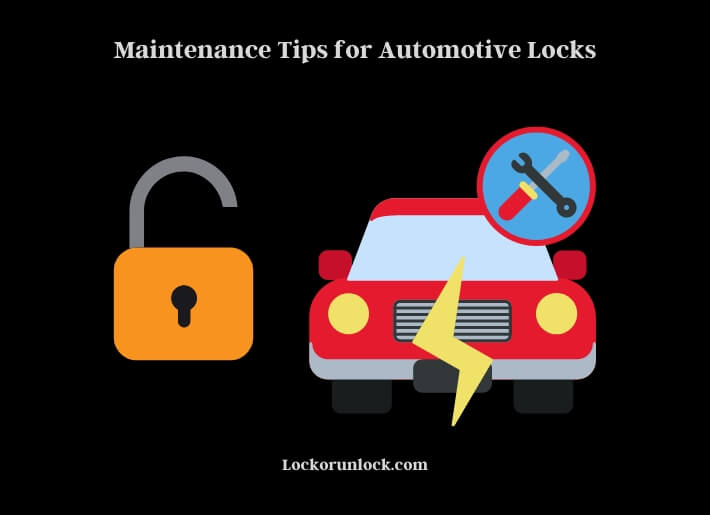Automotive locks are an essential component of any vehicle, providing a first line of defense against theft or unauthorized access. They are designed to protect not only the car itself, but also any valuables inside. With the advancement of technology, automotive locks have become more sophisticated, with a range of key-based, electronic, and biometric options available.
Even with modern advancements, automotive locks can still experience problems such as broken keys, faulty locks, or jammed mechanisms, leading to frustration and potentially leaving your vehicle vulnerable to theft. Therefore, it is crucial to maintain your automotive locks and address any issues that may arise promptly.

Types of Automotive Locks
When it comes to automotive locks, there are several types available, each with its own unique features and benefits. In this section, we will discuss the most common types of automotive locks and how they work.
Key-Based Locks
Key-based locks are the most traditional type of automotive locks, consisting of a mechanical lock cylinder that is opened with a key. They can be found on the doors, trunk, and ignition of the vehicle. Key-based locks are reliable and secure, but they are also the easiest to pick or duplicate. Losing or breaking a key can be inconvenient and may require a locksmith to replace.
Electronic Locks
Electronic locks are becoming increasingly popular in modern vehicles. They are operated by a key fob or remote, which sends a signal to the lock to unlock or lock the doors. Electronic locks can also include push-button start systems, where the driver simply presses a button to start the engine. They offer convenience and security, as they are difficult to duplicate or pick. Electronic locks can be vulnerable to hacking or signal jamming.
Biometric Locks
Biometric locks use fingerprint recognition or other forms of biometric identification to unlock the vehicle. They offer a high level of security, as they are difficult to duplicate or hack. They can be expensive and may not be as reliable in extreme weather conditions.
Smart Locks
Smart locks combine electronic and key-based locks, allowing the driver to unlock or lock the doors using a smartphone app. They offer convenience and security, as they can include features such as remote start and GPS tracking. They can also be vulnerable to hacking or signal interference.
Common Automotive Lock Problems
While automotive locks are designed to be reliable and secure, they can still experience problems over time. Here are some of the most common issues that can occur with automotive locks:
Broken or Bent Keys
Keys can become worn, bent, or broken over time, which can cause problems with the lock cylinder. If your key is not working smoothly, it may need to be replaced or repaired.
Faulty Locks
Lock cylinders can become damaged or worn, which can cause them to malfunction. Signs of a faulty lock include difficulty turning the key or a loose lock cylinder. In some cases, the lock may need to be replaced entirely.
Jammed Mechanisms
Sometimes the lock mechanism can become jammed due to dirt, debris, or rust buildup. If you notice difficulty turning the key or unlocking the door, this may be the issue. Cleaning and lubricating the lock mechanism can often solve this problem.
Lost or Stolen Keys
Losing your keys or having them stolen can be a major inconvenience, as it may require rekeying or replacing the locks. In some cases, a locksmith may need to be called to provide access to the vehicle.
Electrical Issues
In electronic locks, electrical issues can occur that prevent the lock from functioning properly. This may include a dead battery in the key fob or a malfunctioning sensor in the lock mechanism.
Maintenance Tips for Automotive Locks
Regular maintenance of your automotive locks can help prevent problems and extend the life of your lock system. Here are some tips for maintaining your automotive locks:

Keep the Lock Mechanism Clean
Dirt, debris, and rust can accumulate in the lock mechanism over time, leading to problems with the lock. Cleaning the lock mechanism regularly with a lubricant or lock cleaner can help prevent this buildup and keep the lock functioning properly.
Lubricate the Lock Mechanism
Lubricating the lock mechanism with a dry lubricant such as graphite or silicone spray can help prevent wear and tear on the lock and key, reducing the risk of a broken or stuck key.
Avoid Forcing the Key
Forcing a key into a lock that is not working properly can cause further damage to the lock mechanism or key. If the key is not turning smoothly, try lubricating the lock or using a spare key. If the problem persists, seek the help of a professional locksmith or mechanic.
Replace Worn or Broken Keys
Worn or broken keys can cause problems with the lock mechanism, and may even become stuck in the lock. Replacing worn or broken keys promptly can help prevent further damage to the lock and key.
Check the Battery in Electronic Locks
If your vehicle has an electronic lock system, it is important to check the battery in the key fob regularly to ensure it is functioning properly. A dead battery can prevent the lock from working, leaving your vehicle vulnerable to theft.
Use a Protective Cover
Using a protective cover for your key can help prevent wear and tear on the key, reducing the risk of a broken or stuck key. Using a cover can help prevent dirt and debris from accumulating in the lock mechanism.
What Are the Key Features of Keyless Lock Systems in Modern Vehicles?
Keyless lock systems in modern vehicle technology offer advanced features that enhance convenience and security. With keyless entry, unlocking and locking your car becomes effortless, while keyless ignition allows for push-button engine starts. Additional benefits include remote engine start, proximity sensors, and alarm systems. These key features streamline the driving experience and provide a seamless integration of technology into modern vehicles.
Upgrades and Additional Security Features
Upgrading your automotive lock system with additional security features can provide added protection against theft and break-ins. Here are some options to consider:
Keyless Entry
Keyless entry systems use a remote or smartphone app to unlock the doors and start the vehicle. This eliminates the need for a physical key and can make it more difficult for thieves to gain access to the vehicle. Some keyless entry systems offer features like remote start and automatic lock/unlock.
Smart Locks
Smart locks use advanced technology like biometric scanners or facial recognition to unlock the vehicle, providing an even higher level of security. These systems can be more expensive, but may be worth it for those who prioritize maximum security.
Alarm Systems
Adding an alarm system to your vehicle can deter thieves and alert you and others to any attempted break-ins. Some alarm systems also have features like automatic door locking and GPS tracking in case of theft.
Steering Wheel Locks
Steering wheel locks attach to the steering wheel and prevent it from turning, making it nearly impossible for thieves to drive the vehicle. These locks are inexpensive and easy to install, but do require manual activation.
Window Tinting
Window tinting can make it more difficult for thieves to see into the vehicle, making it less likely to be targeted. Window tinting can protect the interior of the vehicle from sun damage and provide added privacy.
GPS Tracking
GPS tracking devices can be installed in the vehicle and allow you to track its location in case of theft. Some GPS trackers can even send alerts to your phone if the vehicle is moved without your permission.
How can I Ensure the Security of My Car’s Locking Wheel Nuts?
To ensure the security of your car’s locking wheel nuts, it’s important to know the locking wheel nut code location. You can find this code on a card in the owner’s manual or in the glove box. Keeping this code safe will help you if you ever need to remove or replace the locking wheel nuts.
Can High-Tech Automotive Locks be Used to Secure Amazon Hub Lockers?
Yes, high-tech automotive locks can be utilized to secure Amazon Hub lockers, ensuring a higher level of security for packages. These advanced locks are integral as package theft prevention methods, safeguarding deliveries from potential theft and providing peace of mind for both customers and businesses.
Common Problems with Automotive Locks
Automotive locks can sometimes experience problems, which can make it difficult to lock and unlock your vehicle. Here are some of the most common problems with automotive locks:
Key Won’t Turn
One of the most common problems with automotive locks is when the key won’t turn in the lock cylinder. This can be caused by a number of factors, including a worn key, a damaged lock cylinder, or a malfunctioning ignition switch.
Key Stuck in the Lock
Another common problem is when the key becomes stuck in the lock cylinder. This can be caused by a worn key, a damaged lock cylinder, or a foreign object that has become lodged in the lock mechanism.
Power Locks Not Working
If your vehicle has power locks, they may stop working due to a blown fuse, a malfunctioning actuator, or a problem with the wiring.
Door Handles Not Working
The door handles on your vehicle may stop working due to a broken cable, a malfunctioning latch mechanism, or a problem with the door lock cylinder.
Trunk Won’t Open
If the trunk of your vehicle won’t open, it may be due to a faulty lock mechanism, a broken cable, or a problem with the trunk release button or lever.
Alarm Keeps Going Off
If the alarm on your vehicle keeps going off, it may be due to a malfunctioning alarm system, a problem with the sensors, or a faulty key fob.
Conclusion
Automotive locks play a crucial role in ensuring the safety and security of vehicles. From traditional key locks to more advanced electronic locks, these mechanisms are designed to prevent unauthorized access and theft. While automotive locks are generally reliable, they can still be susceptible to damage, wear and tear, and even hacking attempts.
Therefore, it is important for car owners to be vigilant and take measures to maintain their locks and ensure their security. Regular maintenance, using high-quality locks, and being mindful of potential vulnerabilities are all steps that can help keep your vehicle and its contents safe. Automotive locks are an essential component of vehicle security and should be taken seriously by car owners.
